Chenhui Shao
Adaptive few-shot learning for robust part quality classification in two-photon lithography
Jan 13, 2026Abstract:Two-photon lithography (TPL) is an advanced additive manufacturing (AM) technique for fabricating high-precision micro-structures. While computer vision (CV) is proofed for automated quality control, existing models are often static, rendering them ineffective in dynamic manufacturing environments. These models typically cannot detect new, unseen defect classes, be efficiently updated from scarce data, or adapt to new part geometries. To address this gap, this paper presents an adaptive CV framework for the entire life-cycle of quality model maintenance. The proposed framework is built upon a same, scale-robust backbone model and integrates three key methodologies: (1) a statistical hypothesis testing framework based on Linear Discriminant Analysis (LDA) for novelty detection, (2) a two-stage, rehearsal-based strategy for few-shot incremental learning, and (3) a few-shot Domain-Adversarial Neural Network (DANN) for few-shot domain adaptation. The framework was evaluated on a TPL dataset featuring hemisphere as source domain and cube as target domain structures, with each domain categorized into good, minor damaged, and damaged quality classes. The hypothesis testing method successfully identified new class batches with 99-100% accuracy. The incremental learning method integrated a new class to 92% accuracy using only K=20 samples. The domain adaptation model bridged the severe domain gap, achieving 96.19% accuracy on the target domain using only K=5 shots. These results demonstrate a robust and data-efficient solution for deploying and maintaining CV models in evolving production scenarios.
Near-Field Perception for Safety Enhancement of Autonomous Mobile Robots in Manufacturing Environments
Dec 15, 2025



Abstract:Near-field perception is essential for the safe operation of autonomous mobile robots (AMRs) in manufacturing environments. Conventional ranging sensors such as light detection and ranging (LiDAR) and ultrasonic devices provide broad situational awareness but often fail to detect small objects near the robot base. To address this limitation, this paper presents a three-tier near-field perception framework. The first approach employs light-discontinuity detection, which projects a laser stripe across the near-field zone and identifies interruptions in the stripe to perform fast, binary cutoff sensing for obstacle presence. The second approach utilizes light-displacement measurement to estimate object height by analyzing the geometric displacement of a projected stripe in the camera image, which provides quantitative obstacle height information with minimal computational overhead. The third approach employs a computer vision-based object detection model on embedded AI hardware to classify objects, enabling semantic perception and context-aware safety decisions. All methods are implemented on a Raspberry Pi 5 system, achieving real-time performance at 25 or 50 frames per second. Experimental evaluation and comparative analysis demonstrate that the proposed hierarchy balances precision, computation, and cost, thereby providing a scalable perception solution for enabling safe operations of AMRs in manufacturing environments.
Multi-Modal Fusion of In-Situ Video Data and Process Parameters for Online Forecasting of Cookie Drying Readiness
Apr 22, 2025
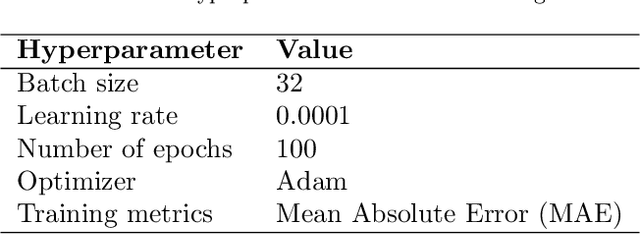
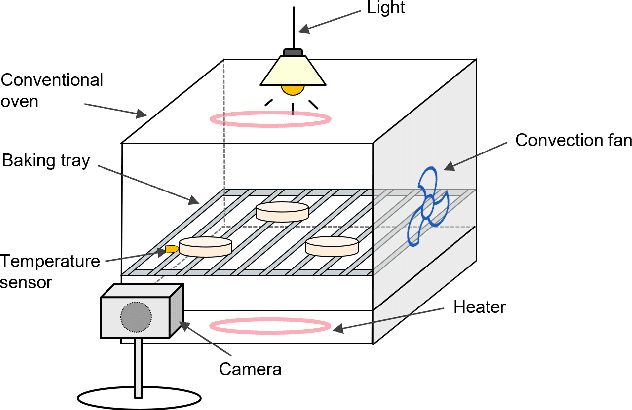

Abstract:Food drying is essential for food production, extending shelf life, and reducing transportation costs. Accurate real-time forecasting of drying readiness is crucial for minimizing energy consumption, improving productivity, and ensuring product quality. However, this remains challenging due to the dynamic nature of drying, limited data availability, and the lack of effective predictive analytical methods. To address this gap, we propose an end-to-end multi-modal data fusion framework that integrates in-situ video data with process parameters for real-time food drying readiness forecasting. Our approach leverages a new encoder-decoder architecture with modality-specific encoders and a transformer-based decoder to effectively extract features while preserving the unique structure of each modality. We apply our approach to sugar cookie drying, where time-to-ready is predicted at each timestamp. Experimental results demonstrate that our model achieves an average prediction error of only 15 seconds, outperforming state-of-the-art data fusion methods by 65.69% and a video-only model by 11.30%. Additionally, our model balances prediction accuracy, model size, and computational efficiency, making it well-suited for heterogenous industrial datasets. The proposed model is extensible to various other industrial modality fusion tasks for online decision-making.
Multi-Modal Data Fusion for Moisture Content Prediction in Apple Drying
Apr 10, 2025

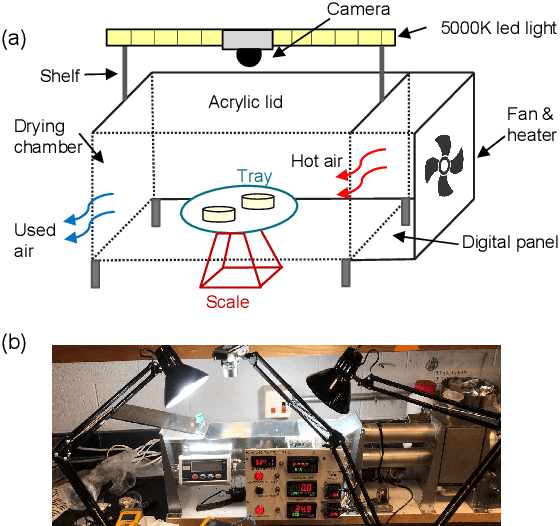
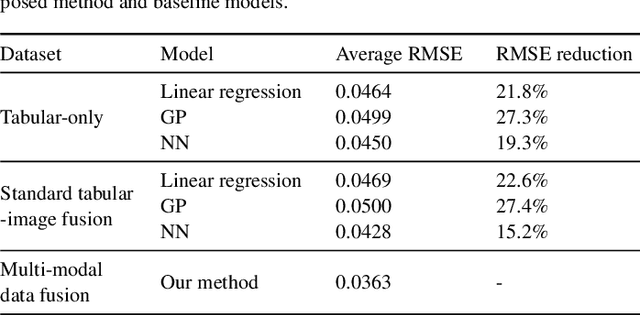
Abstract:Fruit drying is widely used in food manufacturing to reduce product moisture, ensure product safety, and extend product shelf life. Accurately predicting final moisture content (MC) is critically needed for quality control of drying processes. State-of-the-art methods can build deterministic relationships between process parameters and MC, but cannot adequately account for inherent process variabilities that are ubiquitous in fruit drying. To address this gap, this paper presents a novel multi-modal data fusion framework to effectively fuse two modalities of data: tabular data (process parameters) and high-dimensional image data (images of dried apple slices) to enable accurate MC prediction. The proposed modeling architecture permits flexible adjustment of information portion from tabular and image data modalities. Experimental validation shows that the multi-modal approach improves predictive accuracy substantially compared to state-of-the-art methods. The proposed method reduces root-mean-squared errors by 19.3%, 24.2%, and 15.2% over tabular-only, image-only, and standard tabular-image fusion models, respectively. Furthermore, it is demonstrated that our method is robust in varied tabular-image ratios and capable of effectively capturing inherent small-scale process variabilities. The proposed framework is extensible to a variety of other drying technologies.
FDM-Bench: A Comprehensive Benchmark for Evaluating Large Language Models in Additive Manufacturing Tasks
Dec 13, 2024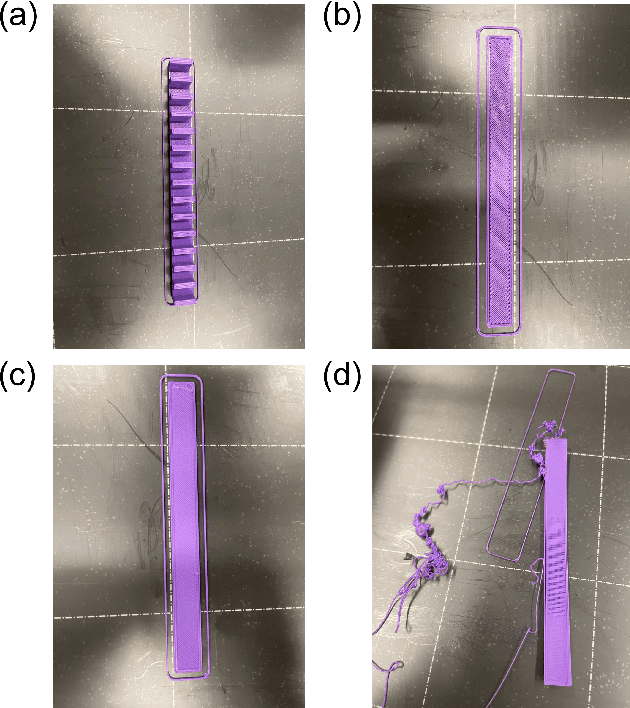

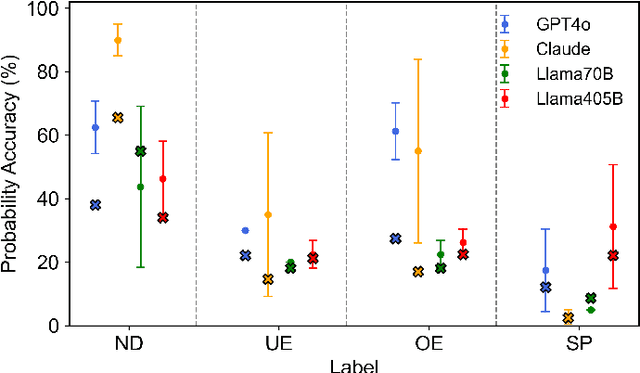
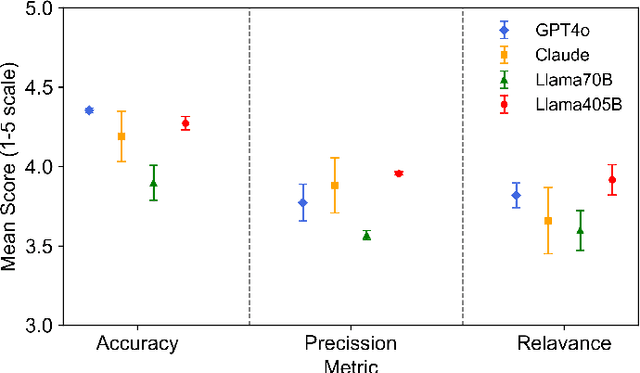
Abstract:Fused Deposition Modeling (FDM) is a widely used additive manufacturing (AM) technique valued for its flexibility and cost-efficiency, with applications in a variety of industries including healthcare and aerospace. Recent developments have made affordable FDM machines accessible and encouraged adoption among diverse users. However, the design, planning, and production process in FDM require specialized interdisciplinary knowledge. Managing the complex parameters and resolving print defects in FDM remain challenging. These technical complexities form the most critical barrier preventing individuals without technical backgrounds and even professional engineers without training in other domains from participating in AM design and manufacturing. Large Language Models (LLMs), with their advanced capabilities in text and code processing, offer the potential for addressing these challenges in FDM. However, existing research on LLM applications in this field is limited, typically focusing on specific use cases without providing comprehensive evaluations across multiple models and tasks. To this end, we introduce FDM-Bench, a benchmark dataset designed to evaluate LLMs on FDM-specific tasks. FDM-Bench enables a thorough assessment by including user queries across various experience levels and G-code samples that represent a range of anomalies. We evaluate two closed-source models (GPT-4o and Claude 3.5 Sonnet) and two open-source models (Llama-3.1-70B and Llama-3.1-405B) on FDM-Bench. A panel of FDM experts assess the models' responses to user queries in detail. Results indicate that closed-source models generally outperform open-source models in G-code anomaly detection, whereas Llama-3.1-405B demonstrates a slight advantage over other models in responding to user queries. These findings underscore FDM-Bench's potential as a foundational tool for advancing research on LLM capabilities in FDM.
Federated Transfer Learning with Task Personalization for Condition Monitoring in Ultrasonic Metal Welding
Apr 20, 2024



Abstract:Ultrasonic metal welding (UMW) is a key joining technology with widespread industrial applications. Condition monitoring (CM) capabilities are critically needed in UMW applications because process anomalies significantly deteriorate the joining quality. Recently, machine learning models emerged as a promising tool for CM in many manufacturing applications due to their ability to learn complex patterns. Yet, the successful deployment of these models requires substantial training data that may be expensive and time-consuming to collect. Additionally, many existing machine learning models lack generalizability and cannot be directly applied to new process configurations (i.e., domains). Such issues may be potentially alleviated by pooling data across manufacturers, but data sharing raises critical data privacy concerns. To address these challenges, this paper presents a Federated Transfer Learning with Task Personalization (FTL-TP) framework that provides domain generalization capabilities in distributed learning while ensuring data privacy. By effectively learning a unified representation from feature space, FTL-TP can adapt CM models for clients working on similar tasks, thereby enhancing their overall adaptability and performance jointly. To demonstrate the effectiveness of FTL-TP, we investigate two distinct UMW CM tasks, tool condition monitoring and workpiece surface condition classification. Compared with state-of-the-art FL algorithms, FTL-TP achieves a 5.35%--8.08% improvement of accuracy in CM in new target domains. FTL-TP is also shown to perform excellently in challenging scenarios involving unbalanced data distributions and limited client fractions. Furthermore, by implementing the FTL-TP method on an edge-cloud architecture, we show that this method is both viable and efficient in practice. The FTL-TP framework is readily extensible to various other manufacturing applications.
WeldMon: A Cost-effective Ultrasonic Welding Machine Condition Monitoring System
Aug 05, 2023



Abstract:Ultrasonic welding machines play a critical role in the lithium battery industry, facilitating the bonding of batteries with conductors. Ensuring high-quality welding is vital, making tool condition monitoring systems essential for early-stage quality control. However, existing monitoring methods face challenges in cost, downtime, and adaptability. In this paper, we present WeldMon, an affordable ultrasonic welding machine condition monitoring system that utilizes a custom data acquisition system and a data analysis pipeline designed for real-time analysis. Our classification algorithm combines auto-generated features and hand-crafted features, achieving superior cross-validation accuracy (95.8% on average over all testing tasks) compared to the state-of-the-art method (92.5%) in condition classification tasks. Our data augmentation approach alleviates the concept drift problem, enhancing tool condition classification accuracy by 8.3%. All algorithms run locally, requiring only 385 milliseconds to process data for each welding cycle. We deploy WeldMon and a commercial system on an actual ultrasonic welding machine, performing a comprehensive comparison. Our findings highlight the potential for developing cost-effective, high-performance, and reliable tool condition monitoring systems.
 Add to Chrome
Add to Chrome Add to Firefox
Add to Firefox Add to Edge
Add to Edge